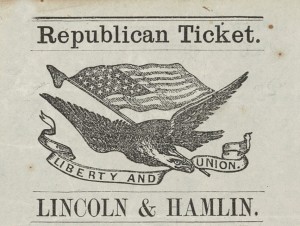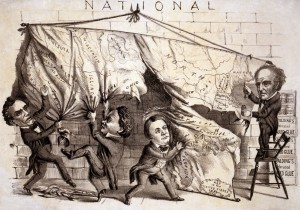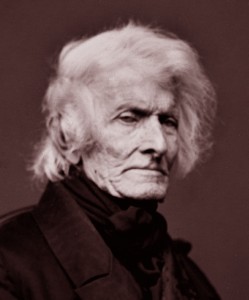 William Wilkins’ letter to James Webb, editor and publisher of the New York Courier and Enquirer, reveals an interesting view on some of the political perspectives that existed on the eve of the 1860 election. Wilkins, who graduated from Dickinson College in 1802, was a Pennsylvania Democratic politician who also served as Secretary of War in President John Tyler’s administration. While Wilkins had originally “intended to have told you something of myself,” he noted that Webb’s political “pamphlet has driven all such things out of my head and set if off ‘a wool gathering.’” Wilkins’ was not happy with Webb’s take on slavery. George Washington “never dreaming he was fighting for kidnapped Africans of the Lowest order of human beings,” Wilkins argued. Wilkins also believed that southerners should be allowed to bring slaves into any territory. “Where is the great right of migration?,” Wilkins asked. Yet Wilkins was careful to note that he did not count Webb among the radical abolitionists. “You must not suppose I include you…in [the] certain mad, fanatical category as full of political wickedness as was John Brown,” Wilkins explained. Wilkins hoped that sectional tensions would be resolved without resorting to disunion, as there could be no “secession, without pulling down the entire wonderfully and wildly constructed fabric” of the Union. While Wilkins’ wife asked him “to burn…this horrible letter,” he refused and sent it onto Webb. You can read the full text of this letter online at House Divided.
William Wilkins’ letter to James Webb, editor and publisher of the New York Courier and Enquirer, reveals an interesting view on some of the political perspectives that existed on the eve of the 1860 election. Wilkins, who graduated from Dickinson College in 1802, was a Pennsylvania Democratic politician who also served as Secretary of War in President John Tyler’s administration. While Wilkins had originally “intended to have told you something of myself,” he noted that Webb’s political “pamphlet has driven all such things out of my head and set if off ‘a wool gathering.’” Wilkins’ was not happy with Webb’s take on slavery. George Washington “never dreaming he was fighting for kidnapped Africans of the Lowest order of human beings,” Wilkins argued. Wilkins also believed that southerners should be allowed to bring slaves into any territory. “Where is the great right of migration?,” Wilkins asked. Yet Wilkins was careful to note that he did not count Webb among the radical abolitionists. “You must not suppose I include you…in [the] certain mad, fanatical category as full of political wickedness as was John Brown,” Wilkins explained. Wilkins hoped that sectional tensions would be resolved without resorting to disunion, as there could be no “secession, without pulling down the entire wonderfully and wildly constructed fabric” of the Union. While Wilkins’ wife asked him “to burn…this horrible letter,” he refused and sent it onto Webb. You can read the full text of this letter online at House Divided.
19
Nov
10
Election of 1860 – William Wilkins Letter
Posted by sailerd Published in Antebellum (1840-1861), Letters & Diaries Themes: Carlisle & Dickinson, Contests & Elections17
Nov
10
Election of 1860 – Cumberland County
Posted by sailerd Published in Antebellum (1840-1861), Images, Recent Scholarship Themes: Carlisle & Dickinson, Contests & ElectionsWhile Abraham Lincoln was elected “by one of the largest voter turnouts in United States history,” historian Phillip Shaw Paludan notes that “the Republican victory was entirely sectional.” Lincoln and Hannibal Hamblin did not receive any votes from the Deep South states. Yet divisions also existed within northern states, including Cumberland County, Pennsylvania. The election results for Carlisle reflected a deep divide in the community – while Republicans won the town (overall votes in Carlisle West Ward / East Ward), Democrats received the most votes overall in Carlisle District (For more details, see election return tables below). As for Cumberland County, Lincoln received 51.5% of the vote in Cumberland County. These results largely correspond with historians’ arguments about urban and rural voting patterns in the 1860 election. While “one might expect to find northern cities to have been stronghold of Republicanism,” David Potter argues that “Lincoln received much less support in the urban North than he did in the rural North.” Republicans received the most votes by far in the rural precincts of Cumberland County and came very close to losing Carlisle. One can see which precinct Lincoln’s party won in the map below — precincts that Republicans won have blank backgrounds. This map was originally published in John Wesley Weigel’s “Free Soil: The Birth of the Republican Party in Cumberland County,” Cumberland County History Journal (Summer 2000). The full article, along with other essays that explore the political history of the Whigs and Democrats in Cumberland County, are available on this post as PDF files.
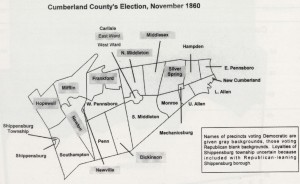
(Click on the map to see larger version)
In addition, you can click the “Continue Reading” link below to see the detailed election returns for Cumberland County, Carlisle District, and Newville District below –
continue reading "Election of 1860 – Cumberland County"
15
Nov
10
“Beyond the Log Cabin: Kentucky’s Abraham Lincoln”
Posted by sailerd Published in 19th Century (1840-1880), Historic Periodicals, Images, Letters & Diaries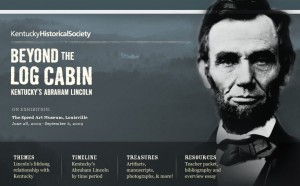 “Beyond the Log Cabin: Kentucky’s Abraham Lincoln” is a great online exhibit created by the Kentucky Historical Society. This interactive site includes manuscripts and artifacts from over 40 repositories nationwide and the content is divided into four overall categories – Themes, Timeline, Treasures, and Resources. Themes include topics such as “Frontier World of Abraham Lincoln,” “Lincoln’s Rise,” “Lincoln and Kentucky at War,” and “Remembering Lincoln: Then and Now.” Each one has a short essay as well as relevant documents, images, and other relevant artifacts. The Timeline section explores Lincoln’s life in Kentucky as well as how the state has commemorated the Sixteenth President after April 1865. The Treasures section allows visitors to explore all of the photographs, manuscripts, and other artifacts in an interactive display. Resources include a Teacher’s guide, a bibliography, and an essay originally published in the Kentucky Historical Society Chronicle.
“Beyond the Log Cabin: Kentucky’s Abraham Lincoln” is a great online exhibit created by the Kentucky Historical Society. This interactive site includes manuscripts and artifacts from over 40 repositories nationwide and the content is divided into four overall categories – Themes, Timeline, Treasures, and Resources. Themes include topics such as “Frontier World of Abraham Lincoln,” “Lincoln’s Rise,” “Lincoln and Kentucky at War,” and “Remembering Lincoln: Then and Now.” Each one has a short essay as well as relevant documents, images, and other relevant artifacts. The Timeline section explores Lincoln’s life in Kentucky as well as how the state has commemorated the Sixteenth President after April 1865. The Treasures section allows visitors to explore all of the photographs, manuscripts, and other artifacts in an interactive display. Resources include a Teacher’s guide, a bibliography, and an essay originally published in the Kentucky Historical Society Chronicle.
12
Nov
10
Cornelia Peake McDonald Journal
Posted by sailerd Published in Civil War (1861-1865), Letters & Diaries Themes: Women & Families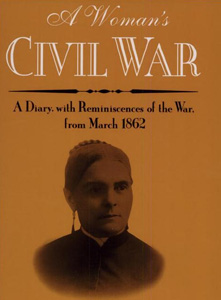 Winchester, Virginia in the Shenandoah Valley was arguably the most contested town of the Civil War. Depending on how you count, the community changed hands over seventy times during four years. Several women kept diaries, wrote remarkable letters or crafted post-war reminiscences. One of the best hybrid collections (part-diary/ part-recollection) comes from Cornelia Peake McDonald who wrote with great talent and behaved with outrageous defiance. After Union soldiers “threatened to come in and break up the furniture if breakfast was not immediately given them,” McDonald and her children prepared to defend their home – McDonald described how they “fastened down the windows and tried… to keep them from coming in at the door.” Raising children in a town like Winchester with lots of soldiers stationed in the vicinity also presented other challenges. After her son was arrested on the suspicion of throwing a snowball at a Union officer, McDonald observed that –
Winchester, Virginia in the Shenandoah Valley was arguably the most contested town of the Civil War. Depending on how you count, the community changed hands over seventy times during four years. Several women kept diaries, wrote remarkable letters or crafted post-war reminiscences. One of the best hybrid collections (part-diary/ part-recollection) comes from Cornelia Peake McDonald who wrote with great talent and behaved with outrageous defiance. After Union soldiers “threatened to come in and break up the furniture if breakfast was not immediately given them,” McDonald and her children prepared to defend their home – McDonald described how they “fastened down the windows and tried… to keep them from coming in at the door.” Raising children in a town like Winchester with lots of soldiers stationed in the vicinity also presented other challenges. After her son was arrested on the suspicion of throwing a snowball at a Union officer, McDonald observed that –
“I have to be constantly on the watch for fear of my boys doing something to provoke the persecution of the Yankees. Not long since I heard an explosion in the yard loud enough to create some alarm, and on hurrying out saw a squad of soldiers approaching the scene of action, thinking it was an alarm. The noise proceeded from a battery the boys had erected on the top of the cistern and had supplied it with guns they had manufactured out of musket barrels cut into lengths of eight or nine inches, and bored for a touch hole, then mounted on carriages of their own make. I had noticed them very busily engaged about the yard for some time but never dreamed what they were after.”
You can read other excerpts from McDonald’s diary on Google Books.
9
Nov
10
Kate Stone Journal
Posted by sailerd Published in Civil War (1861-1865), Letters & Diaries Themes: Slavery & Abolition, US & the World, Women & Families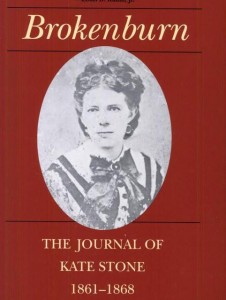 Kate Stone was twenty-years-old when Fort Sumter fell to Confederate forces. She was thrilled. Stone was an ardent southern nationalist from Louisiana who lived on a large plantation (Brokenburn) with many slaves and an extended family, including at least two brother who would die in the Confederate army. Within a month after Sumter, Stone began a diary the she kept for seven years. The material was full of biting insights and wise comments. Stone lived through General Ulysses Grant’s Vicksburg Campaign in 1863 and feared the arrival of black troops into the region. After African Americans entered military service, Stone argued that “the Paternal Government at Washington has done all in its power to incite a general insurrection throughout the South, in the hopes of thus getting rid of the women and children in one grand holocaust.” She and her family fled to Texas in 1863 and lived there until the end of the war. The young plantation mistress was suitably unimpressed by Texans and frontier life. Stone’s sardonic tone appeared frequently in her journal and sometimes was especially hardened. Following Lincoln’s assassination, she remarked on her satisfaction at his fate. “All honor to J. Wilkes Booth, who has rid the world of a tyrant and made himself famous for generations,” she wrote. Stone returned to Brokenburn –which had been devastated by the war—helped rebuild the place, married in 1869 and lived until 1907. When her diary was published in 1955, it was to wide acclaim, hailed by critics such as Edmund Wilson and by crowds –an estimated 10,000 folks in Louisiana including her 77-year-old daughter (who lived until 1972) and has since become regarded as a Civil War classic, though it is not as well known and familiar as Mary Chesnut’s diary.
Kate Stone was twenty-years-old when Fort Sumter fell to Confederate forces. She was thrilled. Stone was an ardent southern nationalist from Louisiana who lived on a large plantation (Brokenburn) with many slaves and an extended family, including at least two brother who would die in the Confederate army. Within a month after Sumter, Stone began a diary the she kept for seven years. The material was full of biting insights and wise comments. Stone lived through General Ulysses Grant’s Vicksburg Campaign in 1863 and feared the arrival of black troops into the region. After African Americans entered military service, Stone argued that “the Paternal Government at Washington has done all in its power to incite a general insurrection throughout the South, in the hopes of thus getting rid of the women and children in one grand holocaust.” She and her family fled to Texas in 1863 and lived there until the end of the war. The young plantation mistress was suitably unimpressed by Texans and frontier life. Stone’s sardonic tone appeared frequently in her journal and sometimes was especially hardened. Following Lincoln’s assassination, she remarked on her satisfaction at his fate. “All honor to J. Wilkes Booth, who has rid the world of a tyrant and made himself famous for generations,” she wrote. Stone returned to Brokenburn –which had been devastated by the war—helped rebuild the place, married in 1869 and lived until 1907. When her diary was published in 1955, it was to wide acclaim, hailed by critics such as Edmund Wilson and by crowds –an estimated 10,000 folks in Louisiana including her 77-year-old daughter (who lived until 1972) and has since become regarded as a Civil War classic, though it is not as well known and familiar as Mary Chesnut’s diary.
8
Nov
10
New York Times Features House Divided Image
Posted by sailerd Published in Antebellum (1840-1861), Images Themes: Contests & Elections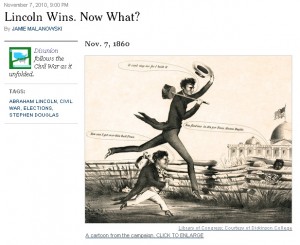 A blog post by Jamie Malanowski in the New York Times’ “Disunion” series featured this political cartoon from House Divided’s image collection. In this entry Malanowski explores Abraham Lincoln’s victory in the 1860 election. Malanowski’s post is part of a new series that, as the New York Times explains, “revisits and reconsiders America’s most perilous period — using contemporary accounts, diaries, images and historical assessments to follow the Civil War as it unfolded.” Other entries include “Hearing the Returns with Mr. Lincoln,” “The Abolitionist’s Epiphany,” “Head-Stompers, Wrench-Swingers and Wide Awakes,” and “A Slave Ship in New York.”
A blog post by Jamie Malanowski in the New York Times’ “Disunion” series featured this political cartoon from House Divided’s image collection. In this entry Malanowski explores Abraham Lincoln’s victory in the 1860 election. Malanowski’s post is part of a new series that, as the New York Times explains, “revisits and reconsiders America’s most perilous period — using contemporary accounts, diaries, images and historical assessments to follow the Civil War as it unfolded.” Other entries include “Hearing the Returns with Mr. Lincoln,” “The Abolitionist’s Epiphany,” “Head-Stompers, Wrench-Swingers and Wide Awakes,” and “A Slave Ship in New York.”
3
Nov
10
Election of 1860 – Carlisle American Volunteer
Posted by sailerd Published in Antebellum (1840-1861), Historic Periodicals Themes: Carlisle & Dickinson, Contests & ElectionsWhen Democrats held a rally in Carlisle, Pennsylvania on October 6, 1860, the Carlisle (PA) American Volunteer reported that no one had been ready for the “overwhelming avalanche” of delegates from “every town and township in the county.” Over 8,000 people filled the streets before noon, according to some estimates. The American Volunteer backed Senator Stephen Douglas and supported this event as a means to rally Democratic voters before a critical election. In the months before the election, the American Volunteer tried to convince Cumberland County residents that the Republican party represented a serious threat. “The election of LINCOLN will be the death-knell to our Republic,” as the American Volunteer warned. As Republican “Wide Awake” groups held parades in northern cities, the American Volunteer reported that “each man carried a six-barreled revolver” in order to demonstrate that “LINCOLN and his party are determined to carry out their sectional doctrines at all hazards and at any sacrifice.” The American Volunteer saw Republicans as a “sectional Abolition party” which was determined to “humble the South [and] root out slavery.” If Republicans carried out their plan, the American Volunteer predicted that “every State in the Union will be bathed in blood.” Only a Democratic victory in November 1860 would ensure a future for the Union. If Lincoln won, the American Volunteer observed that it “will be regarded as a declaration of war.” Yet the American Volunteer’s arguments failed to convince a sufficient number of Cumberland County voters – Lincoln ended up with a 400 vote majority. “A long dreary winter is ahead,” the American Volunteer predicted.
29
Oct
10
Grand Review in Harrisburg, PA – November 14, 1865
Posted by sailerd Published in Historic Periodicals, Reconstruction (1865-1880) Themes: Battles & Soldiers After African American soldiers were not allowed to participate in the Union army’s Grand Review in Washington DC in May 1865, Harrisburg residents organized their own event on November 14, 1865 for those who served in the United States Colored Troops. While this earlier post provides an overview, several other newspaper articles offer interesting accounts about the event. “No day could have been chosen more propitious for the occasion,” as the correspondent for the Philadelphia (PA) Inquirer observed that November 14 was “one of the finest of this most pleasant Indian summer.” After Simon Cameron delivered a speech, letters from those who could not attend were read aloud. General Benjamin F. Butler explained that he had “witnessed…[African American soldiers’] bravery and good conduct on the battle-field, and, above all, their devotion and unswerving loyalty to the flag and government.” Even “when their offers of service in the beginning of the way were rejected with contumely,” George L. Stearns noted that they still “promptly volunteered at the call of their country when she needed them to help conquer a relentless foe.” Others used the event to argue for equal rights. “All constitutional privileges, all laws, all ordinances, all regulations of States, discriminating against colored men, must be made null and void,” as Senator Henry Wilson proclaimed. The event ended with “the John Brown Song,” which as the Philadelphia (PA) Inquirer correspondent described, “the assemblage sang…with great zeal.” You can also read more about the ceremony in an excerpt from Ceremonies at the Reception of Welcome to the Colored Soldiers of Pennsylvania (1865)
After African American soldiers were not allowed to participate in the Union army’s Grand Review in Washington DC in May 1865, Harrisburg residents organized their own event on November 14, 1865 for those who served in the United States Colored Troops. While this earlier post provides an overview, several other newspaper articles offer interesting accounts about the event. “No day could have been chosen more propitious for the occasion,” as the correspondent for the Philadelphia (PA) Inquirer observed that November 14 was “one of the finest of this most pleasant Indian summer.” After Simon Cameron delivered a speech, letters from those who could not attend were read aloud. General Benjamin F. Butler explained that he had “witnessed…[African American soldiers’] bravery and good conduct on the battle-field, and, above all, their devotion and unswerving loyalty to the flag and government.” Even “when their offers of service in the beginning of the way were rejected with contumely,” George L. Stearns noted that they still “promptly volunteered at the call of their country when she needed them to help conquer a relentless foe.” Others used the event to argue for equal rights. “All constitutional privileges, all laws, all ordinances, all regulations of States, discriminating against colored men, must be made null and void,” as Senator Henry Wilson proclaimed. The event ended with “the John Brown Song,” which as the Philadelphia (PA) Inquirer correspondent described, “the assemblage sang…with great zeal.” You can also read more about the ceremony in an excerpt from Ceremonies at the Reception of Welcome to the Colored Soldiers of Pennsylvania (1865)
27
Oct
10
As the 150th anniversary of the 1860 election is next week, the House Divided project has just published seven interactive essays at Journal Divided that focus on different aspects of Abraham Lincoln’s campaign. These essays have been adapted with permission from the unedited manuscript of Michael Burlingame’s Abraham Lincoln: A Life (2008). One can read about the origins of the “rail-splitter” image and Lincoln’s efforts to gain support from the Know Nothings. In addition, one will find an overview of the Republican National Convention as well as a detailed look at how Lincoln won the nomination. While Lincoln instructed his allies at the convention to “make no contracts that will bind me,” Burlingame discusses the contradictory claims and evidence about the deals made to secure Lincoln’s nomination. In the final essay Burlingame examines the political conditions that produced a Republican victory in November 1860. As you read the essays, be sure to click through the sidenotes on every page. These contain links to relevant records on House Divided, including those for documents, events, people, place, major topics, and sources. For example, the Gott resolution is mentioned on page 5 of the “Lincoln Know Nothing” essay. If you are unfamiliar with that topic, simply click on the “Events” sidenote to learn more. Each essay also has a video, which you can watch by clicking on the YouTube icon.
16
Oct
10
Don’t Miss This Neo-Confederate Video!
Posted by Matthew Pinsker Published in Civil War (1861-1865), General Opinion, Video
There is a video on the YouTube channel of the Georgia Division of the Sons of Confederate Veterans (SCV) that offers a classic teaching moment. The video, entitled “Sesquicentennial Celebration,” urges those about to honor the 150th anniversary of the “War for Southern Independence” to remember what the SCV claims the war was really about. From their perspective, brave southerners fought to defend “their homes and families” against “an aggressive northern invasion.” The narrator proceeds to touch upon almost all of the elements of the “Lost Cause” or Neo-Confederate argument –the “insurmountable odds” of the fight, the battle over home and hearth (not slavery), the heroic leadership of figures such as Robert E. Lee, and the tyrannical tendencies of Lincoln and the northern government. My thanks to Matt Karlsen who first notified me about Kevin Levin’s post on this video at his well-regarded Civil War Memory blog.
